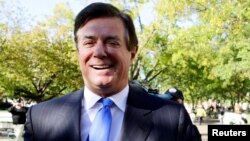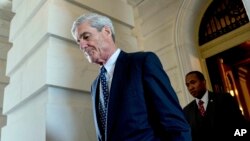The indictment of Paul Manafort, President Donald Trump’s former campaign chairman, has sent a chill through Washington’s foreign lobbying community.
Manafort and his former business associate, Rick Gates, are accused of serving as unregistered agents of a foreign government in violation of the Foreign Agents Registration Act.
The law requires anyone that carries out “political activities” for a foreign government or foreign political party to disclose to the Justice Department their work and spending. Failure to comply carries a prison sentence of up to five years.
But enforcement remains lax. Too few lobbyists register and violators are rarely punished. Between 1966 and 2015, the Department of Justice brought just seven criminal FARA cases.The Manafort indictment marks the eighth such case.
Broken system
Special counsel Robert Mueller's decision to include FARA charges in a 12-count indictment against Manafort and Gates has put the foreign lobbying community on notice that the Department of Justice will toughen enforcement.
And members of Congress are looking into fixing what critics see as a broken system.
Top Republicans, Senator Chuck Grassley and Representative Mike Johnson, introduced identical bills on Tuesday to empower the Department of Justice to enforce FARA.
In an interview with VOA, Joshua Ian Rosenstein, a partner at the law firm of Sandler Reiff Lamb Rosenstein & Birkenstock who advises clients on FARA compliance, discusses the fallout from the indictment. The interview has been edited for length and clarity.
Q: Tell us how the Manafort/Gates indictment is playing out on Washington's K Street?
Rosenstein: This was really earth shattering for the legal community, folks like myself who do FARA law and political law, but it was also really earth shattering for the regulated advocacy community.
Washington’s worst kept secret is that shadow lobbying, particularly on behalf of foreign governments, has been taking place (for generations). Part of the reason that was happening is because nobody felt that there was a stick to go along with whatever theoretical carrot there would have been.
But that has changed now (with) the very high-profile indictment all over the press. Seeing an indictment being brought for specific FARA violations is a sign that the law itself is really on the radar of prosecutors in general and certainly the Justice Department.
You (also) have members of Congress who have held hearings and will hold more hearings on FARA itself (and that) will lead to increased attention by the FARA office to be more aggressive within the bounds of their budget and statutory restraint.
Q: What changes are needed to toughen enforcement of FARA?
Rosenstein: One of them may have been addressed in Senator Grassley’s bill, if it’s passed and the president signs it. Having the ability to compel individuals suspected of being unregistered agents of foreign governments to participate and produce documents, theoretically to produce testimony as part of the Department of Justice’s investigation, is critical to ensuring enforcement.
The second issue is that the FARA unit is relatively small. The higher the priority placed on enforcement of a particular law, the larger the budget needs to be. So operating with too small a budget and too small a purview is a recipe for frustration.
Q: Give us your read on the Manafort/Gates indictment. Do prosecutors have enough evidence to obtain a FARA criminal conviction?
Rosenstein: Assuming that the indictment bears out in terms of the actual evidence Mr. Mueller possesses, this is about as textbook an example of a FARA violation as I can think of.
What’s particularly fascinating about the indictment is the second FARA charge. The first FARA charge was failure to register. The second FARA charge was making materially false statements on the FARA disclosures that were filed. This is a situation where Mr. Manafort went ahead, talked to the FARA office at the Department of Justice, made retroactive filings and apparently lied on those retroactive filings.
Q: What is the penalty for a FARA violation?
Rosenstein: The penalty for a FARA violation is up to five years in prison per violation and a $10,000 fine per violation. What’s interesting about the indictment is there are two counts.
One count is for failing to register. The other count is for making materially false representations on the retroactive filing and making false statements to the Department of Justice. Conceivably, each one of those misrepresentations could be a separate FARA violation. I think the indictment lists four or five.
You could see an aggressive prosecutor saying these are four separate willful and knowing violations. And we’ll seek up to five years for each one.





